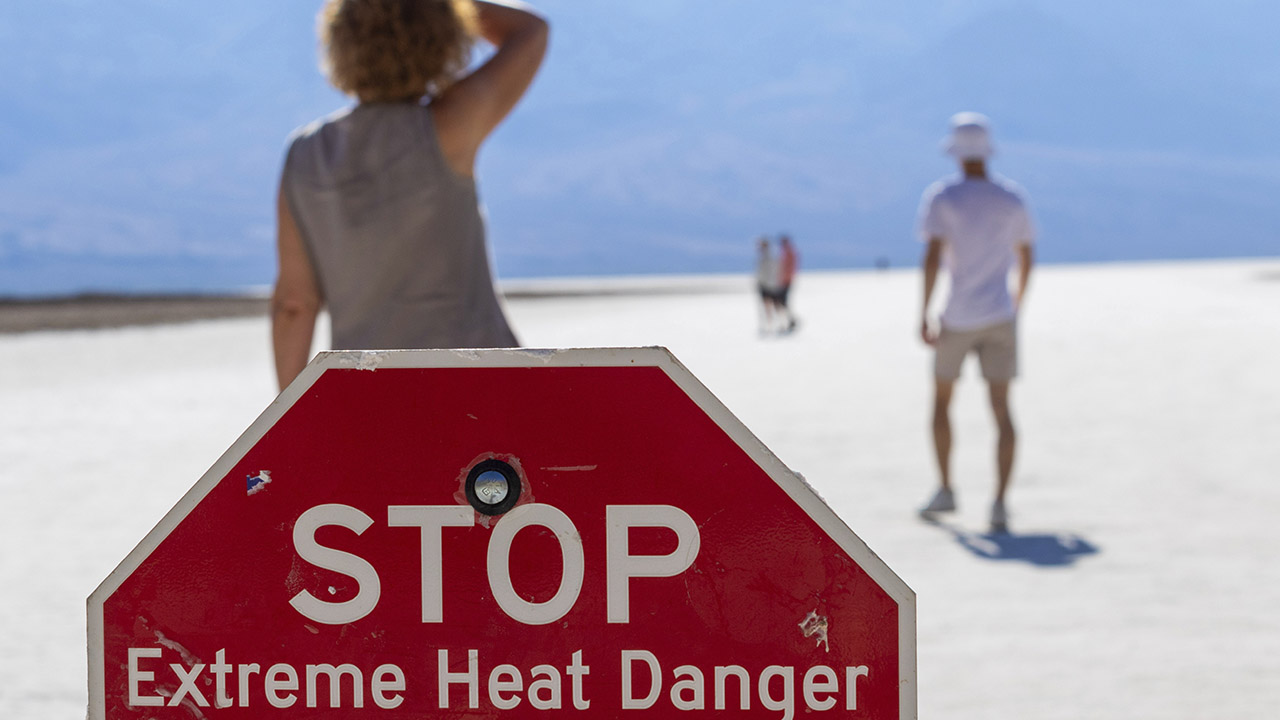Poll reveals widespread impact of extreme heat on Americans' daily lives and finances, with 7 in 10 reporting effects on electricity bills. (AP File)

- Extreme heat affects 7 in 10 Americans, surpassing impact of other weather events like wildfires and hurricanes.
- Hispanic and lower-income Americans more likely to report sleep disruptions due to extreme heat, poll finds.
- 70% of U.S. adults believe climate change is happening, with half becoming more concerned over the past year.
Share
|
Getting your Trinity Audio player ready...
|
WASHINGTON — During the summer, Levena Lindahl closes off entire rooms, covers windows with blackout curtains and budgets to manage the monthly cost of electricity for air conditioning. But even then, the heat finds its way in.
“Going upstairs, it’s like walking into soup. It is so hot,” Lindahl said. “If I walk past my attic upstairs, you can feel the heat radiating through a closed door.”
Lindahl, 37, who lives in North Carolina, said her monthly electricity bills in the summer used to be around $100 years ago, but they’ve since doubled. She blames a gradual warming trend caused by climate change.
Related Story: Increasing Wind and Heat Plus Risk of Thunderstorms Expected in Fight Against ...
Americans Feel the Heat in Their Wallets
Around 7 in 10 Americans say in the last year extreme heat has had an impact on their electricity bills, ranging from minor to major, and most have seen at least a minor impact on their outdoor activities, according to a poll from The Associated Press-NORC Center for Public Affairs Research.
As tens of millions of Americans swelter through another summer of historic heat waves, the survey’s findings reveal how extreme heat is changing people’s lives in big and small ways. The poll found that about 7 in 10 Americans have been personally affected by extremely hot weather or extreme heat waves over the past five years. That makes extreme heat a more common experience than other weather events or natural disasters like wildfires, major droughts and hurricanes, which up to one-third of U.S. adults said they’ve been personally affected by.
Sizable shares of Americans – around 4 in 10 – report that extreme heat has had at least a minor impact on their sleep, pets or exercise routine.
Related Story: Beat the Heat With Adventure and History Aboard the Sugar Pine Railroad
Adapting to Rising Temperatures
Jim Graham, 54, lives in Phoenix, Arizona, and worries about the safety of his dog’s paws when going on walks outside, especially when it gets above 105 degrees Fahrenheit (40 degrees Celsius). To protect her feet, they head out for walks at 5:30 a.m. “This year it seems hotter than usual,” said Graham. His single-level home has central air conditioning and even setting the thermostat to 80 degrees Fahrenheit (27 degrees Celsius) runs him over $350 a month in electricity bills, a big jump from what he used to pay about a decade ago.
He’s not the only one watching the dollars add up: About 4 in 10 Americans say they’ve had unexpectedly expensive utility bills in the past year because of storms, flood, heat, or wildfires, including nearly half of homeowners.
Like Lindahl, many see a link to climate change. About 7 in 10 U.S. adults who have experienced some type of severe weather events or weather disasters in the last five years say they believe climate change was a contributing factor. Three in 10 think climate change was not a cause.
Related Story: Fresno Extends Free Movie Tickets Offer for Seniors to Beat the Heat
The Rising Temperature Trend
Last year Earth was 2.66 degrees Fahrenheit (1.48 degrees Celsius) warmer than it was before pre-industrial times, according to the European climate agency Copernicus. Some might perceive that increase as insignificant, but temperatures are unevenly fluctuating across the planet and can be dangerous to human health. Several regions of the U.S. set all-time temperature records this summer, and Las Vegas reached a scorching 120 degrees Fahrenheit (48.9 degrees Celsius) on July 7.
According to the poll, about 1 in 10 Americans say that extreme heat has had a major impact on their sleep in the past year, while about 3 in 10 say it’s had a minor impact and 55% say it’s had no impact. Hispanic Americans are more likely than white Americans to say their sleep has been affected, and lower-income Americans are also more likely than higher-income Americans to report an effect on their sleep.
The effects of extreme heat are more widely reported in the West and South. About half of people living in the West say their sleep has been impacted at least in a minor way by extreme heat, while about 4 in 10 people living in the South say their sleep has been impacted, compared to about 3 in 10 people living in the Midwest and Northeast. People living in the West and South are also more likely than those in the Northeast to say their exercise routines have been affected.
Other aspects of daily life – like jobs and commutes, the timing of events like weddings and reunions, and travel and vacation plans – have been less broadly disrupted, but their impact is disproportionately felt among specific groups of Americans. About one-quarter of Americans say that their travel or vacation plans have been impacted by extreme heat, with Hispanic and Black Americans more likely than white Americans to say this.
Even simply enjoying time outside has become more difficult for some. The poll found that about 6 in 10 Americans say extreme heat has impacted outdoor activities for themselves or their family.
In general, people who don’t believe climate change is happening are less likely to report being affected by various aspects of extreme heat compared to people who do. For instance, about 8 in 10 Americans who believe that climate change is happening say extreme heat has had at least a minor impact on their electricity bills, compared to half of Americans who aren’t sure climate change is happening or don’t think it’s happening.
Mario Cianchetti, 70, is a retired engineer who now lives in Sedona, Arizona. His home has solar panels and heat pumps, which he installed because he was interested in lowering his electricity bills to save money. “When you retire, you’re on a single fixed income. I didn’t want to have to deal with rising energy costs,” said Cianchetti, who identified himself as a political independent.
Cianchetti noted that temperatures feel unusually warm but said installing sustainable technologies in his house was a matter of finance. “It’s not that I don’t believe in climate change, yeah I believe we’re going into a hot cycle here, but I don’t believe that it’s man-caused.”
When it comes to general views of climate change, 70% of U.S. adults say climate change is happening. About 6 in 10 of those who believe climate change is happening say that it’s caused entirely or mostly by human activities, while another 3 in 10 say it’s caused equally by human activities and natural changes to the environment and 12% believe it’s primarily caused by natural environmental change. Nine in 10 Democrats, 7 in 10 independents and about half of Republicans say climate change is happening.
Those numbers are essentially unchanged from when the question was last asked in April and have been steady in recent years, although about half of Americans say they have become more concerned about climate change over the past year.
RELATED TOPICS:
Categories

What to Know About the Homeland Security Shutdown


















